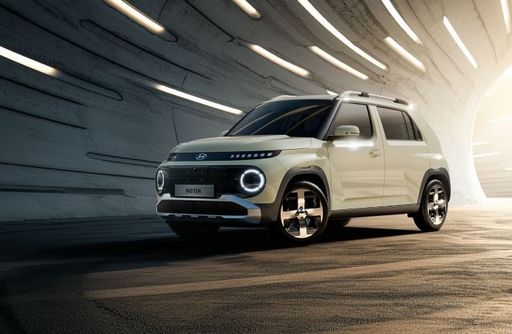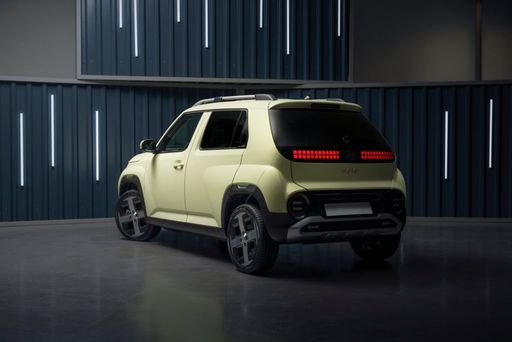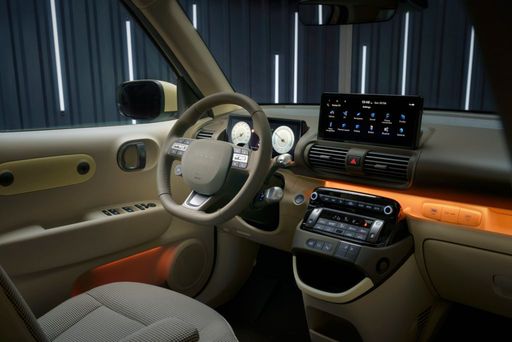Maxus Deliver 9 vs Hyundai Inster - Differences and prices compared
Costs and Efficiency:
When it comes to price and running costs, the biggest differences usually appear. This is often where you see which car fits your budget better in the long run.
Hyundai Inster has a significantly advantage in terms of price – it starts at 20500 £, while the Maxus Deliver 9 costs 38700 £. That’s a price difference of around 18264 £.
In terms of energy consumption, the advantage goes to the Hyundai Inster: with 14.30 kWh per 100 km, it’s convincingly more efficient than the Maxus Deliver 9 with 26.20 kWh. That’s a difference of about 11.90 kWh.
As for range, the Hyundai Inster performs slight better – achieving up to 370 km, about 12 km more than the Maxus Deliver 9.
Engine and Performance:
Under the bonnet, it becomes clear which model is tuned for sportiness and which one takes the lead when you hit the accelerator.
When it comes to engine power, the Maxus Deliver 9 has a significantly edge – offering 204 HP compared to 115 HP. That’s roughly 89 HP more horsepower.
In acceleration from 0 to 100 km/h, the Hyundai Inster is clearly quicker – completing the sprint in 10.60 s, while the Maxus Deliver 9 takes 16 s. That’s about 5.40 s faster.
In terms of top speed, the Maxus Deliver 9 performs hardly perceptible better – reaching 160 km/h, while the Hyundai Inster tops out at 150 km/h. The difference is around 10 km/h.
There’s also a difference in torque: Maxus Deliver 9 pulls convincingly stronger with 375 Nm compared to 147 Nm. That’s about 228 Nm difference.
Space and Everyday Use:
Whether family car or daily driver – which one offers more room, flexibility and comfort?
Seats: Maxus Deliver 9 offers clearly more seating capacity – 7 vs 4.
In curb weight, Hyundai Inster is clearly lighter – 1380 kg compared to 2360 kg. The difference is around 980 kg.
In maximum load capacity, the Maxus Deliver 9 performs convincingly better – up to 12500 L, which is about 11441 L more than the Hyundai Inster.
When it comes to payload, Maxus Deliver 9 convincingly takes the win – 1140 kg compared to 357 kg. That’s a difference of about 783 kg.
Who comes out on top?
Overall, the Maxus Deliver 9 shows itself to be secures victory with a clear margin and secures the title of DriveDuel Champion.
It convinces with the more balanced overall package and proves to be the more versatile choice for everyday use.

Maxus Deliver 9
Costs and Consumption
View detailed analysis
Engine and Performance
View detailed analysis
Dimensions and Body
View detailed analysis
Maxus Deliver 9
The Maxus Deliver 9 is a no-nonsense cargo hauler that pairs clever practicality with a surprisingly car-like driving feel, making it a smart choice for urban fleets and weekend DIY warriors. It may not stop traffic for looks, but its roomy, sensible interior and dependable demeanour mean you get work done without the drama.
detailsHyundai Inster
The Inster has quickly captured the attention of automotive enthusiasts with its striking design and dynamic performance. This model seamlessly blends advanced technology with comfort, making it an ideal choice for both daily commutes and adventurous road trips. With its spacious interior and innovative features, the Inster promises an exhilarating driving experience that doesn’t compromise on practicality.
details @ Hyundai Motor Company
@ Hyundai Motor Company
 @ Hyundai Motor Company
@ Hyundai Motor Company
 @ Hyundai Motor Company
@ Hyundai Motor Company
 @ Hyundai Motor Company
@ Hyundai Motor Company
|
|
|
|
|
Costs and Consumption |
|
|---|---|
|
Price
38700 - 60200 £
|
Price
20500 - 25800 £
|
|
Consumption L/100km
8.80 L
|
Consumption L/100km
-
|
|
Consumption kWh/100km
26.2 - 30.8 kWh
|
Consumption kWh/100km
14.3 - 15.1 kWh
|
|
Electric Range
287 - 358 km
|
Electric Range
327 - 370 km
|
|
Battery Capacity
-
|
Battery Capacity
42 - 49 kWh
|
|
co2
0 - 231 g/km
|
co2
0 g/km
|
|
Fuel tank capacity
-
|
Fuel tank capacity
-
|
Dimensions and Body |
|
|---|---|
|
Body Type
Cargo Van
|
Body Type
SUV
|
|
Seats
3 - 7
|
Seats
4
|
|
Doors
4
|
Doors
5
|
|
Curb weight
2360 - 2770 kg
|
Curb weight
1380 - 1433 kg
|
|
Trunk capacity
-
|
Trunk capacity
238 - 280 L
|
|
Length
5546 - 5940 mm
|
Length
3825 - 3845 mm
|
|
Width
2062 mm
|
Width
1610 mm
|
|
Height
2525 - 2755 mm
|
Height
1575 - 1610 mm
|
|
Max trunk capacity
7100 - 12500 L
|
Max trunk capacity
1059 L
|
|
Payload
730 - 1140 kg
|
Payload
317 - 357 kg
|
Engine and Performance |
|
|---|---|
|
Engine Type
Diesel, Electric
|
Engine Type
Electric
|
|
Transmission
Manuel, Automatic
|
Transmission
Automatic
|
|
Transmission Detail
Manual Gearbox, Reduction Gearbox
|
Transmission Detail
Reduction Gearbox
|
|
Drive Type
Front-Wheel Drive
|
Drive Type
Front-Wheel Drive
|
|
Power HP
148 - 204 HP
|
Power HP
97 - 115 HP
|
|
Acceleration 0-100km/h
16 - 19 s
|
Acceleration 0-100km/h
10.6 - 11.7 s
|
|
Max Speed
100 - 160 km/h
|
Max Speed
140 - 150 km/h
|
|
Torque
330 - 375 Nm
|
Torque
147 Nm
|
|
Number of Cylinders
4
|
Number of Cylinders
-
|
|
Power kW
108 - 150 kW
|
Power kW
71 - 85 kW
|
|
Engine capacity
1996 cm3
|
Engine capacity
-
|
General |
|
|---|---|
|
Model Year
2022 - 2024
|
Model Year
2025
|
|
CO2 Efficiency Class
G, A
|
CO2 Efficiency Class
A
|
|
Brand
Maxus
|
Brand
Hyundai
|
Is the Maxus Deliver 9 offered with different drivetrains?
Available configurations include Front-Wheel Drive.
The prices and data displayed are estimates based on German list prices and may vary by country. This information is not legally binding.
